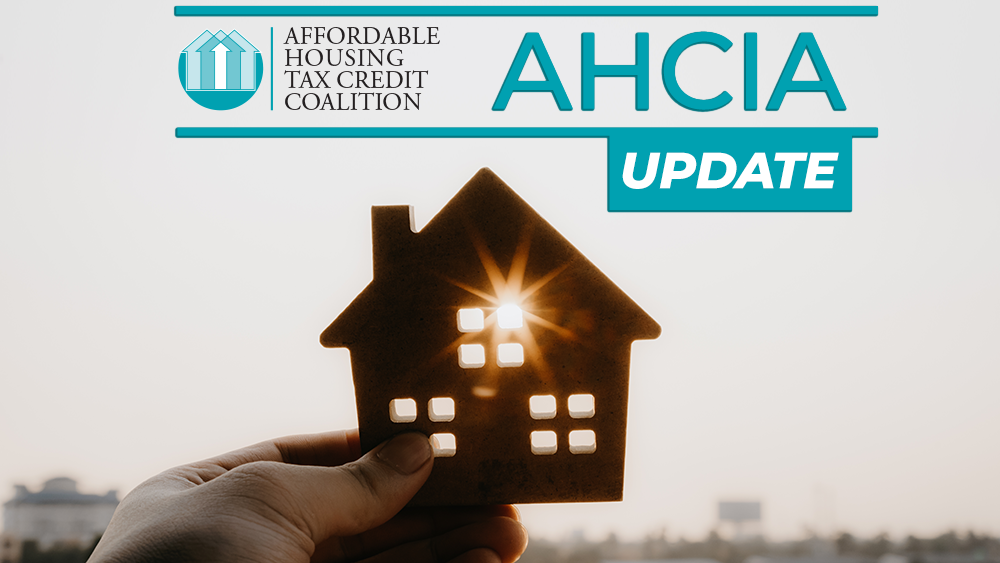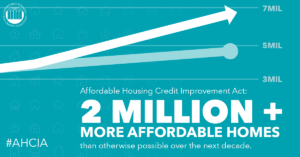The Affordable Housing Tax Credit Coalition applauds the reintroduction of legislation that could expand and strengthen the Low-Income Housing Tax Credit (Housing Credit) to finance more than 2 million additional affordable homes than otherwise possible over the next ten years, according to analysis by Novogradac & Co.
Reintroduced in both chambers of Congress today, the Affordable Housing Credit Improvement Act (AHCIA) of 2021 (S.1136/H.R.2573, see bill text and summary; ) is comprehensive legislation to increase the impact of the Housing Credit, our nation’s primary tool to finance the development and preservation of affordable housing. This critical legislation comes at a time when the need for affordable housing has reached historic levels.
The AHCIA would expand access to affordable housing resources, provide states with additional flexibilities, streamline program rules, and make the Housing Credit more effective in hard-to-reach rural and Native American communities. The bill would also help states use the Housing Credit to benefit their lowest-income residents, such as homeless veterans. Key provisions are explained in greater detail below.
While the vast majority of the AHCIA of 2021 is identical to the AHCIA of 2019, there are several key changes. Recognizing the growing urgency of the affordable housing crisis, the AHCIA of 2021 accelerates the proposed 50 percent Housing Credit allocation increase over two years, rather than the five years proposed in previous version of the AHCIA. A new provision would also reduce the 50 percent bond-financing threshold to 25 percent, allowing states to more efficiently finance affordable housing, access 4 percent Housing Credits, and utilize Private Activity Bonds. Additional modifications from the 2019 version of the legislation are explained here.
“More than 10 million households nationwide were paying more than half of their monthly income on rent prior to the COVID-19 crisis, and millions more are now struggling to keep a roof over their heads,” said Matt Josephs, President of the AHTCC Board of Directors and Senior Vice President for Policy at the Local Initiatives Support Corporation. “The Affordable Housing Credit Improvement Act will help address our nation’s severe affordable housing shortage at a time when bold investments in affordable housing are sorely needed.”
“The Affordable Housing Credit Improvement Act is the solution we need now to provide affordable homes for struggling renters and to help rebuild our economy and infrastructure,” said AHTCC Executive Director Emily Cadik. “This bipartisan legislation would provide more than 2 million sorely needed affordable homes over the next decade through a proven model that leverages both the public and private sectors.”
“For decades, the affordable housing community has been building congressional support for the housing credit through the work we do best: sharing the impact of the housing credit through groundbreakings, ribbon cuttings, property tours, and direct advocacy,” Cadik said in an op-ed in Affordable Housing Finance, 2021 Could be a Watershed Year for Affordable Housing. “Our work led more than one-third of the last Congress to co-sponsor the AHCIA in less than six months, and our challenge today is to build even broader support even faster, recognizing that infrastructure legislation is already under development.”
Bipartisan Support for the AHCIA
The AHCIA was first introduced in Congress in 2016, and in the last Congress gained the broadest support yet with over 270 bipartisan co-sponsors, including 41 Senators and over half the House. Three key provisions from the AHCIA have now been enacted: a minimum 4 percent Housing Credit rate in 2020, and a 12.5 percent allocation increase (for 2018 to 2021) and “income averaging,” which allows properties to serve tenants with a broader range of incomes, in 2018.
The AHTCC thanks our affordable housing champions in Congress for their steadfast support for the Housing Credit and leadership of the AHCIA. The Senate AHCIA is led by Senators Maria Cantwell (D-WA), Todd Young (R-IN), Ron Wyden (D-OR), and new lead sponsor Rob Portman (R-OH), pictured below.




The House AHCIA is led by Representatives Suzan DelBene (D-WA), Jackie Walorski (R-IN), Don Beyer (D-VA), and new lead sponsor Brad Wenstrup (R-OH), pictured below.




Share Your Support for the AHCIA on Social Media
Help us build momentum for the AHCIA by sharing the below images on social media, which can be downloaded by clicking on the images. In your posts, please feel free to link to our AHCIA webpage or summary document, use #AHCIA, and tag us at @AHTCCoalition.
AHCIA Resources
- AHTCC Resource: AHCIA Overview
- AHTCC Webpage: The AHCIA
- ACTION Detailed Bill Summary
- Changes Between 2019 and 2021 AHCIA
- AHTCC Resource: Lowering the 50 Percent Test
- AHTCC Resource: AHCIA and Infrastructure
If you cannot access the resources, please email Megan John, AHTCC Director of Advocacy and Engagement, at megan.john@taxcreditcoalition.org.
Attend the AHTCC Webinar and Virtual Fly-in
Register for the AHTCC Webinar on the AHCIA: Wednesday, April 21, 2:00 to 3:00 pm ET
To learn about the AHCIA, register for our upcoming webinar on Wednesday, April 21, at 2:00 pm ET. We’ll discuss key provisions of the AHCIA, its potential impact, and how to advocate for its advancement. There is no registration fee to join this webinar. Register here.
Save the Dates for the AHTCC Virtual Fly-In: Monday, May 10 through Friday, May 14
During the week of May 10, the AHTCC will hold a virtual fly-in for AHTCC members to advocate for the AHCIA. The AHTCC will arrange virtual meetings with key congressional staff throughout the week and provide participants with talking points and additional resources ahead of the meetings. We will provide more information and open registration soon.
Advocate for the AHCIA
The Biden Administration has released an infrastructure and economic recovery proposal that includes an expansion of the Housing Credit, and Congress is beginning to work on infrastructure legislation that could include substantial investments in affordable housing. Building support for the AHCIA is the best way to ensure that any infrastructure legislation includes provisions to expand and strengthen the Housing Credit.
We encourage AHTCC members and stakeholders to contact the members of Congress that represent you or the areas in which you work to request their support for the AHCIA. Visit our Advocacy Webpage to learn more and contact Megan John at megan.john@taxcreditcoalition.org for assistance.
Key Provisions in the AHCIA
The AHCIA of 2021 would:
Increase affordable housing production and preservation
- Increase the annual Housing Credit allocation by 50 percent over current levels, phased in over 2 years
- Expand access to Housing Credits and more efficiently use Private Activity Bond financing by reducing the bond-financing threshold from 50 percent to 25 percent
Better serve hard-to-reach areas and populations
- Make more developments serving extremely low-income and formerly homeless tenants financially feasible through a 50 percent basis boost if needed for financial feasibility
- Encourage developments in rural and Native American communities through a 30 percent basis boost if needed for financial feasibility
- Facilitate the revitalization of higher-poverty communities and the development of more properties in high-opportunity areas by removing the Qualified Census Tract population cap and increasing the Difficult Development Area population cap
- Support Housing Credit developments for veterans by codifying that veterans are an exception to the General Public Use rule
Remove barriers to affordable housing preservation
- Facilitate safe tenant relocation during the rehabilitation of Housing Credit properties by allowing relocation costs to be capitalized by the Housing Credit
- Ensure properties are given enough time to rebuild after a casualty loss
- Allow flexibility for existing tenants income recertifications when refinancing properties
Streamline program rules and promote efficiency
- Make the Housing Credit more compatible with energy tax incentives
- Prohibit local approval requirements that can prevent developments from moving forward due to Not in My Backyard (NIMBY) opposition
- Clarify that states can determine the definition of a community revitalization plan
- Better align Housing Credit rules with the Violence Against Women Act
- Ensure that rules designed to prevent college students from living in Housing Credit properties do not unfairly penalize residents seeking to further their education
- Add cost reasonableness as a Qualified Allocation Plan selection criteria










Comments are closed.